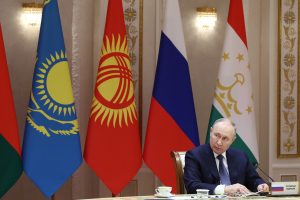Ukraine’s cross-border assault into the Kursk region of Russia on August 6 took the world by surprise. The unexpected attack by a small state against a nuclear power has turned Russian President Vladimir Putin’s narrative of greatness and invincibility into dust and ash. While Western analysts have largely fixated on the tactical advances made by Ukrainian forces into Russian territory, this attack has also exposed a strategic weakness in Russia as an alleged great power.
Russia finds itself isolated in its conflict in Ukraine, with its allies, both within and outside the Collective Security Treaty Organization (CSTO) – a military alliance similar to NATO that includes Armenia, Belarus, Kazakhstan, Kyrgyzstan, and Tajikistan – extending neither military nor political support.
Central Asian states are politically and militarily tied to Russia either through membership in the CSTO or bilateral treaties of allied relations. One of the fundamentals that sustains a military organization or allied relations is coordination and political support among members when deemed necessary. Like NATO’s Article 5, Article 4 of the CSTO stipulates, “If one of the States Parties is subjected to aggression by any state or group of states, then this will be considered aggression against all States Parties to this Treaty.” The same principles form the basis of allied relations. Although Uzbekistan is not a member of the CSTO, it signed and ratified a Treaty of Allied Relations with Russia in 2005.
Despite the agreements that Moscow has established with the Central Asian republics – except Turkmenistan, which maintains a policy of “positive neutrality” – Central Asia has maintained a coordinated silence, providing neither military assistance nor political support to Russia amid the Ukrainian intervention into Kursk.
This demonstrates the ineffectiveness of allied relations and proves that the CSTO exists mostly as a paper structure, significantly undermining Russian regional authority.
This is not the first time the issue of the CSTO’s incompetence has popped up. Belarusian President Aleksandr Lukashenko criticized the organization for ignoring Kyrgyzstan’s request for assistance in amid ethnic clashes in 2010. He said: “What sort of organization is this one, if there is bloodshed in one of our member states … and this body keeps silent?”
In addition, Uzbekistan’s secession from the CSTO (twice, in 1999 and 2012) created a crack, while Armenia’s more recent freezing of its membership in the organization – due to the inaction of the CSTO amid an ultimately successful Azerbaijani onslaught into the territory of Nagorno-Karabakh – unloosed a serious reputational crisis for the organization.
The coordinated silence of the Central Asian republics amid Ukraine’s intrusion into Russian territory, in turn, is yet another blow to the reputation of both the CSTO as a military bloc and Russia as a supposed great power.
Importantly, the Kremlin has not requested any military assistance from its allies per the CSTO charter requirements or the treaty of allied relations. On August 16, the CSTO’s press service responded to Russian media requests regarding the Kursk incursion that, if necessary, the organization “will implement all necessary procedures” but noted that such a request had not yet been made.
However, the absence of any official reaction among the Central Asian states on the Ukrainian intervention in Kursk should be considered another significant piece of evidence of Moscow’s declining authority in the region, which I have discussed elsewhere.
The tendencies that emerged as a result of the Kursk crisis, thus, may have far-reaching implications for Central Asian regional processes and open a window of opportunity for the West to increase its presence in the region.
At the Astana Summit of the heads of state of Central Asia that took place on August 9, participating leaders announced a roadmap for trade and defense policy coordination. For instance, Uzbek President Shavkat Mirziyoyev highlighted the detrimental effects of the Russian-Ukrainian crisis on regional trade and mentioned that regional integration is the most optimal way to mitigate these challenges. Kazakh President Kassym-Jomart Tokayev called for regional security and defense policy coordination among the five Central Asian republics. The Russian decline might create an opportunity to transform these initiatives into practice.
These unfolding events also create fertile soil for Washington to revitalize its involvement in regional processes. The weakening of Russian authority offers a window of opportunity for the U.S. to restore its credibility and presence in the region, which was damaged after the withdrawal from Afghanistan. According to the revisited U.S. Strategy for Central Asia 2019-2025, Washington aims to strengthen the sovereignty and independence of the Central Asian republics by fostering connectivity among them, thus alleviating the influence of Russia and China. Thus, the emergence of a strong and independent Central Asia aligns with the strategic goals of the United States.
However, what remains uncertain is the readiness of all five Central Asian states to tie themselves together through regional integration, even amid a Russian decline. While Uzbekistan and Kazakhstan advocate for catalyzing integration, not all leaders stressed the institutionalization of regional cooperation in the same way. Whether or not the U.S. will stay committed to strengthening the sovereignty of Central Asian states is also in question, especially if Donald Trump wins the presidential election and reinstates his “America first” policy.

































